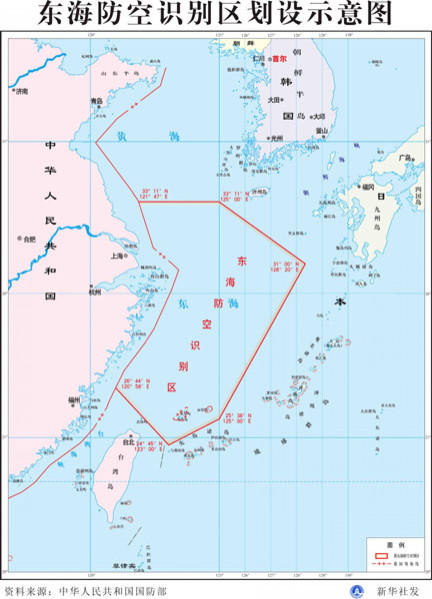China's Air Defense Identification Zone (ADIZ) Ignites US, Japan Dismay, And Chinese Netizens' Support

Effective this weekend, China’s government declared an Air Defense Identification Zone that includes a significant part of disputed areas in the East China Sea. As the U.S. and Japanese governments express concern over Chinese posturing in the hotly disputed area, Chinese netizens are applauding the move.
In an official statement regarding the ADIZ, established on Saturday at 10 a.m., China’s Ministry of National Defense announced that flight plans and other identifying information would be required for all aircraft operating in that zone. “If an aircraft doesn’t supply its flight plan, China’s armed forces will adopt emergency defensive measures in response,” the state-run Xinhua News Agency reported. “The announcement states that China’s Ministry of National Defense has full administrative rights over the zone.”
U.S. Defense Secretary Chuck Hagel released an official statement on the ADIZ, expressing deep concern. “We view this development as a destabilizing attempt to alter the status quo in the region,” he said, adding that the unilateral decision by China “increases the risk of misunderstanding and miscalculations” in the region. Hagel also affirmed that the U.S. remains aligned with its allies in the region, specifically Japan. The territorial dispute involves mainly the cluster of islands referred to by Japan as the Senkaku and by China as the Diaoyu. Japan’s Foreign Minister Fumio Kishida said “one-sided action” will potentially “trigger unpredictable events” and “cannot be allowed.”
The Diaoyou/ Senkaku island dispute has been several years in the making. China’s public has mostly expressed praise for the ADIZ, extolling Beijing’s decision to defend Chinese sovereignty. On Sina Weibo, China’s version of Twitter, conversation on the disputed area exploded, with more than 200,000 posts mentioning the published air defense map. “Now, our might will match our words,” one Chinese blogger wrote in response to the ADIZ. “Claiming what is ours and now defending what is ours,” another said.
According to Tea Leaf Nation, a news blog following the views of China through the scope of social media, many netizens supported the announcement in spite of the inevitable tension it caused. “This is something that is worth fighting for,” one blogger posted, emulating the popular microblogger, Lin Zhibo, who is a journalist for the Communist Party newspaper the People’s Daily, in saying, “This is a danger we must have the courage to shoulder.”
After the U.S. and Japan released comments condemning the new air defense zone, Chinese Foreign Minister Qing Gang bit back. “Japan has no right to make irresponsible remarks or wage deliberate offenses over China’s establishment of the East China Sea ADIZ,” Qin said, saying that such ”groundless accusations” from Japan are what could lead to “frictions or undermine regional stability.”
Though China and the U.S. are inevitably economically intertwined, China is insisting that the U.S. stay out of Sino-Japanese politics. “The U.S. should keep its word of not taking sides on the issue concerning the sovereignty of the Diaoyu Islands and stop making improper comments,” Qin said.
© Copyright IBTimes 2024. All rights reserved.






















